#NGE spoilers (technically)
Text
Hello!! This is the warning chart I promised earlier. Thank you all for your patience, I hope this works for whoever needs it. I'm super proud of this so I hope it helps!! <3
It includes a disclaimer, color key, and explanation for the ratings I have assigned.
#neon genesis evangelion#epilepsy#I hope this helps!!#end of evangelion#NGE#NGE spoilers (technically)
45 notes
·
View notes
Text
thoughts on totk now that i’ve beaten it
under the cut bc of length and bc there is honestly a fair bit of negative stuff
i don’t really think i can say that i liked totk.
it’s fine, it’s genuinely fucking incredible from a technical standpoint with ultrahand, recall, the three map layers and with how smoothly it ran for me. as a game it’s fine.
i’ll start with the things i dislike and end with what i actually liked
i honestly didn’t really like ultrahand? i disliked how much the game leaned on it, since so many puzzles and whatever just boiled down to ‘make something that’ll work’ and it just... it was far too clunky for me to really enjoy using it, outside of using some of the same few designs for traversal. there were a few times when i could see what the game wanted me to do with ultrahand and the given zonai parts and sometimes it just... didn’t work at all. more often than not ultrahand was frustrating for me to use so the game’s reliance on it just made it into a chore sometimes.
in a similar vein the dungeons were serious letdowns. i mean, don’t get me wrong, they’re fine, they had good themes and (mostly) had good aesthetics and general looks and identities to them, but the fact that they were just... basically twenty-ish minute little things was kind of disappointing. i hate that they all had the exact same ‘go hit x number of switches’ gimmick. it really limited what you could do and fucked with the dungeon design, too. the only one where that really worked for me was the fire temple, which was my favorite overall. the water temple was especially dismal, with the least inspired look and just being an astoundingly easy experience. the puzzles in those dungeons were so awfully easy, too, especially since half of the time they just hand you what you need so you barely need to really assess the situation and put a plan together
i hated the water dungeon’s little mini-areas where you do a single piss-easy puzzle to automatically get your prize, i hated the wind temple’s god damn ‘pull a lever and get your prize’ kind of puzzles, i hated how soul-crushingly disappointed i felt when i took a look at the lightning temple’s map and realized that every fucking floor had a singular room just for the switch puzzle. god forbid it’s as fun as the lowest level of that temple. i really miss stuff like mini-bosses or rooms where you have to do a puzzle in order to just... progress, i miss dungeons that i could get lost in or spend a while in or just had... something more interesting or some more substance so that i can’t just breeze through like it’s a glorified shrine. most of the puzzles in those dungeons were simpler than some shrines i did.
i didn’t care to do much exploration since there honestly isn’t much motivation to explore the surface map if you’ve already played botw, and the scarcity of materials this time really got to me, it took me a while to have a half-decent stock of materials, and i still had trouble not running out of stuff even though i was using amiibos to stock up on some things. the money situation was rough, too... a lot of things are cheaper to sell, but some armor is still really expensive plus you have to pay the great fairies to upgrade your equipment in addition to having the correct materials. that especially felt odd- having to grab a handful of (goddamn hard to get) lynel guts is hard enough to upgrade the soldier’s armor, but you want me to cough up 500 rupees, too??
(the scarcity of monster guts also got on my nerves, but i’ll just chalk that up to just some kind of really weird difficulty thing. it was annoying until i tracked down the stronger monsters.)
the story is probably the weakest part of the game to me. it’s really hard to have a baseline investment when you don’t care about these characters, anyway, and what i saw in this game’s story still failed to endear me to hardly any of them. link’s role frustrated me; he just comes off like a tool rather than a character this time through, he barely has any actual relevancy to the story segments beyond being the guy who can use the master sword and being the player’s vehicle to get from point a to b in the story. the blank stare and limited emoting worked in botw because... there’s a given reason for his lack of outward emotion in the past, plus he has no memory in the present. it makes sense. but this time around, he’s gotten memories in the years between this and the last game, but he just feels like a background character in most of the story beats.
he has no role in the memories and in the present just exists to gather some stuff for other people, he gets the master sword from zelda and then helps the other sages get their secret stones, but he’s barely addressed as his own character in the grand scheme of things unless he’s being directly spoken to. he’s just the swordsman capable of wielding the master sword and zelda’s chosen protector as far as the story is concerned. he has no opinions outside of doing what he’s told and looking for zelda. at least not as far as i could really tell. at least in botw, the story directly concerns him, and it’s his story we’re following. this time around zelda and the sages seem like the most important characters, link’s just... there, doing what he’s been told to.
the new sages are fine, none of them really endeared themselves to me, and i will say that making the player watch essentially the exact same cutscene each time you finish a dungeon was BAFFLING. they were long and you learned almost nothing new after the first one, and there was nothing done to make them very distinct to each individual pair of sages or their respective regions; at the very least, it could have been interesting to meet the ancient sages not in the exact same stone garden, but perhaps at the top of a snowy mountain for the rito, near a volcano or something for the goron, maybe in a shallow pool of water for the zora, and in the desert for the gerudo- but no, they’re all effectively the same thing just with the speaking character swapped out with some minor changes.
(the sages themselves are a pain in the ass to use, having to chase them down to activate their power or accidentally activating a power when you don’t want it; yunobo was honestly my favorite, but because i generally defaulted to having them all activated at all times, i had a lot of trouble with tulin blowing shit away from me when i was trying to grab it while midair. they’re half-decent for combat)
i didn’t really care for rauru or sonia, either. rauru in the present as a ghost was fine, he was kind of interesting and seemed to have changed from his time in the past, but he never managed to be a character i particularly liked. i wasn’t really a fan of his... arrogance? or something in the past scenes, and he never really came off as very interesting. sonia was nearly completely uninteresting which is a shame since she has an interesting design, she just felt delegated to the role of supporting rauru and zelda and then dying to motivate them.
ganondorf is a character i was really looking forward to seeing, and it really fucking sucks that he’s so god damn one-dimensional this time! the story can’t be fucked to delve into him beyond just giving us scenes that just tell us that he’s evil and wants to rule hyrule and get the secret stones and nothing else because fuck having complex villains, i guess. especially frustrating because within the game itself you can draw more interesting motivations up for him, but the game really just doubles-down on him being evil for the fuck of it and wanting to end the world because uhhhh... he’s evil don’t fucking worry about it
the ignoring of the triforce in this game sucks in that way, too, because the way the triforce works and how it can grant wishes made it a much more interesting goal for ganondorf to attain, rather than some poorly-named ‘secret stones’ that do nothing more than just amplify power or something. it sucks how black-and-white this damn story is and how it seems like it just wants to do away with any possible nuance or gray area. no one but the bad guys or side characters are flawed in any actually interesting or significant way.
at least ganondorf was still the most interesting character in the flashbacks.
and then zelda, oh god ZELDA. i honestly really liked her in botw. i liked how you saw her as a flawed, insecure, pressured teen, and how you saw her struggles to relate to link and how she eventually warmed up to him. you saw her as a flawed person who develops and as someone who cares deeply about her friends and her duties and gets frustrated by her failings.
and then in totk a lot of her more interesting traits- her interest in sheikah tech, her excitement over field study and research, her more defining traits as this incarnation of zelda- are basically sanded down and she’s just this perfect flawless princess with great power and an insanely passive role in the past beyond finally taking some kind of action after one of her friends dies and she’s pushed to the brink. cool. great.
she has practically no flaw in totk. if anyone in the present talks about her, they have nothing bad to say and just want to please her and follow her orders, she is right in telling the gerudo how to train their troops she is right even when misheard to tell people to put themselves in danger and she is hardly meaningfully questioned when her imposter is doing very clearly suspicious shit. neither the story nor any of the characters wants to let her be flawed. she’s just perfect in damn near every way and barely retains any interesting characterization she got in botw. there are some interesting snippets in her being a teacher and setting up memorials to those who died in the calamity, but there’s hardly any more than that, and it makes it really hard for me to give a damn about her. she’s not interesting this time.
the whole thing with zelda becoming a dragon too, is... it’s fine. it’s ok. but the fact that she turns back at the end with no problem whatsoever is one hell of a fucking misstep. why talk about draconification being forbidden for a good reason anyways if it doesn’t actually matter anyways??? if you never actually see any of those fucking repercussions why even bring them up??? i really feel like it would have been more effective for there to have been actual consequences for zelda beyond just fucking flying around half-conscious for a millennium or whatever- have her lose her memory when she’s brought back! there you go! there’s the reason why draconification is forbidden! there’s the thing about losing yourself! plus, zelda losing her memories as a result would mirror link having lost his memories in botw! that has so much more weight and significance then ‘oh uh ignore the warnings from a while back she’s completely fine dw abt it’ i hate that she’s back just like that without any of the consequences that the game suggests.
the dragon’s tears in general kinda just felt weaker than botw’s memories anyways bc you’re more just. watching stuff happen then actually learning anything. it has less characters and yet i feel like you only get to know like half of the important ones. like three of them are all about the same event. a few times they just replay parts of old memories in new ones. if they ever reference a past memory they just show you what they’re referencing instead of leaving you to piece it together. just play the voices or something don’t break the flow of things to play a clip of something i’ve already seen.
plus the fact that totk... barely acknowledges that it’s a sequel to botw really rubs me the wrong way. i understand that loz is extremely loose with its lore, but totk is a direct sequel set in the same world a few years later, and yet the events and characters of botw have might as well been forgotten and its all either ignored, brushed aside, or straight up replaced by something else for no good reason. the continuity between these games is absolutely dismal and to see the different ways in which the events and concepts or botw are just... disregarded really just left a bad taste in my mouth.
just- i love good stories and worlds in video games, and while some games can coast by for me by feeling good to play, having a good and engaging story and characters is usually essential to my enjoyment of a game, and when i don’t care about to the point of disliking the story and characters, and when none of the important areas are fascinating or distinct enough from each other, and when the game even fails to really reel me in with the gameplay...
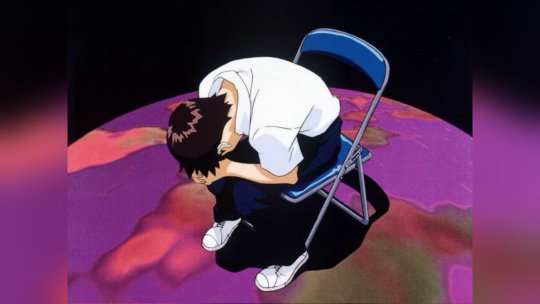
i wanted to like totk, but it really just did not work for me. i just ended up feeling frustrated and disappointed and even sometimes bored with all of the major stuff and man. totk is really, REALLY, not for me, and it just left me wanting to play older zelda games instead.
...
HOWEVER! there were actually some things i really loved about totk! it’s not all doom and gloom! (well, not all doom, at least)
so! the music was great! not all of it really fit or made a lot of sense with the context in which they played or failed to evoke the feeling they were meant to, but the new tracks in this game were great! i especially love the first two phases of the fire temple’s theme, the depths music, and most of the new battle and boss themes. zelda games almost never fail when it comes to the music.
i did genuinely like the fire temple- yunobo’s ability was used the best in this dungeon, and it had the best five switches gimmick, i loved how you had to hit the gongs (sometimes having to construct a path to account for the weaknesses of yunobo’s ability) and how it then ‘scared’ each of the five statues holding a part of the gate- it was very cute and fit in very well with the general feel of that part of the story. it was the best in terms of difficulty and complexity, but it didn’t have the best boss- the lightning temple had the best boss, and i will admit that even if most of them were easy, i really enjoyed the mirror puzzles, as well as the process to unlocking the dungeon. the wind temple had my favorite visual identity and aesthetic, though, i liked it being a part of this old rito song, and how it was the most distinct in looks from the other dungeons.
the sky islands were honestly fun, even if they weren’t all that interesting. getting to some of the harder-to-reach islands were some of my favorite times i had to use ultrahand, and stuff like the zonai forge island and the one orblike island with the mirror puzzle, and pretty much all of the more complicated parts of the sky islands were a lot of fun to explore and figure out.
being able to ride on the dragons was just really cool, and the fact that they come out of the chasms was fun.
the new horns for the monsters were cool, it helps differentiate the different monster strengths and i just thought they were really neat.
the quest with lurelin village was fun, even if the pirates just being monsters was a real let-down.
the stable trotters were also a fun bunch of characters, that was a good, new way to open up fairy fountains.
all of the new stuff with the yiga was really fun, like getting their outfit and being able to pretend to be one of them and learning the blademaster attack- so much fun it was so cute.
most of the new outfits are really good and useful, and while a bit janky and not that great, the house-building bit near tarrey was endearing.
while none of the main characters interested me, i really, especially liked tauro and yona and penn. for some reason they just appealed to me and i really wish they had bigger parts in the game because they’re interesting and they have good designs and i’d really like to know more about them.
the underground gerudo shelter was pretty cool, to be honest, and the look of the caves was really cool.
i adored the proving grounds shrines- easily my favorite shrines in the entire game, i had no problem spending a decent amount of time in those kinds of shrines, they were fantastic.
the new ingredients and recipes and new weapons were cool.
the way you basically return to the area you started at on your way to ganondorf is pretty cool, that whole path is really neat.
ganondorf in general was a pretty cool boss, even if he ended up being kind of easy for me. the whole final boss sequence was neat.
by FAR, though, my absolute favorite part of this game was 100% the depths. the fact that there was just an entire second layer to the map that was the same size as the surface, just inverted and dark and filled with new bosses and locations... i spent hours down there without going back up to the surface and absolutely had a BLAST screwing around in the dark, lighting up my path with brightblooms and tossing together little vehicles with lights so that i could get to the next lightroot off in the distance. the depths was probably where i ended up using zonai vehicles the most, and it was honestly pretty fun to go around spotting and reaching every lightroot, coming across different mines and weird little landforms and coliseums and yiga camps. the music and plantlife and look of the depths were so good, and it really felt distinct from the rest of the game in a very good way. doing all of the lightroots and getting enough zonaite to max out link’s energy cells was definitely a good move since it made finding shrines and dealing with later zonai machine stuff easier.
overall, tears of the kingdom was a severely mixed bag for me, and while there was stuff i did like, i don’t think it’s enough to really get me to say that i really liked this game overall- after all most of the stuff i disliked was unavoidable parts of the games, and it definitely put a hamper on my interest in the rest of the time. totk is fine, but it’s really not my thing.
#i just- *slams head into brick wall* bro i did not have a good time with this game#going back to my silly little comparison point; totk was $70 and my copy of phantom hourglass was $70#$70 is a bullshit amount for a game but thats no the point here#totk from a technical baseline standpoint as a GAME is worth $70#its story and the amount of enjoyment it gave me was not worth $70 tho. the story and enjoyment i got from ph was more worth $70 to me#salty talks#loz#legend of zelda#totk#'zelda games almost never fail when it comes to the music' if you talk shit abt ph's soundtrack i'll kill you. i like the dungeon track#i partially have the shinji chair image saved for this but i did also initally save it yesterday when i finished nge#listen this was fine on a surface level but it just wore me the fuck down#link was just some flavor of stonefaced or surprised or determined in any given cutscene and like. idk. wasnt too interested in him either#look i know about the silly little dialogue options. still didnt do it for me#link getting his arm back only makes sense to me bc i got every last light of blessing and heart container and stamina vessel#the gloom in his body is 100% gone hes squeaky clean for me. whyd you take his shirt off tho. at least keep his hat. cant take it seriously#put him in the archaic set or smth his arm is fully visible that way at least and its full circle thats what he wears at the start#couldnt take the whole grabbing zelda sequence seriously bc i missed the (hold) prompt and link flew away lol#totk spoilers#also wasnt really a fan of most of the voice acting yeah sorry. kinda rough all around aside from like ganondorf and dimitri- i mean rauru#mineru and the rito sage were fine too ig. im not going to bother watching any vids or whatever to check again#riju and sidon were fine too#sonia was cool too but everyone else was a lil rough tbh esp with having to say 'secret stone' that name sucks shit#my switch died in the middle of the credits. i had like 25% when i started fighting ganondorf.#it died twice actually cuz i charged it for a few minutes and what like yeah 5% should be good and nope. died again#anyways whatever. im not giving it a rating im tired of this game i dont think i'll be replaying or even just touching it any time soon#music was top notch again tho. made me feel stuff more than the actual story did. cool ig#bitching abt totk
23 notes
·
View notes
Text
I made a post about this earlier but now that I have ~screenshots~ I can maybe elaborate on it a bit more. I’m like 99% sure that the bit of Raph’s dream in the train was an Evangelion reference.



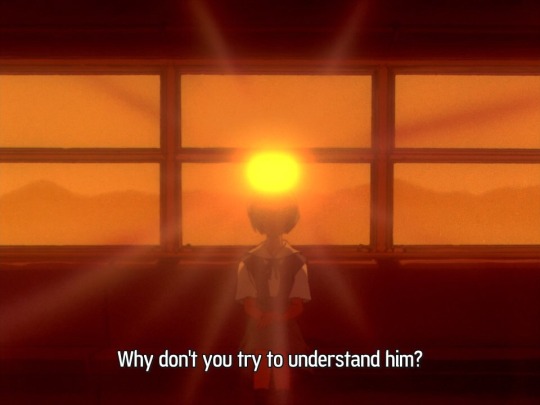
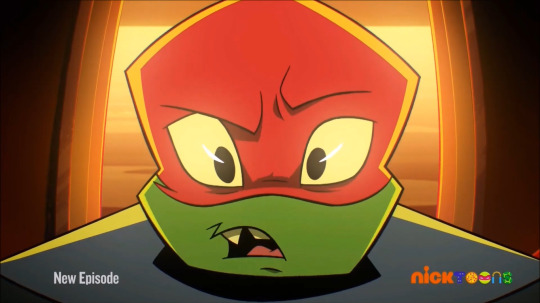
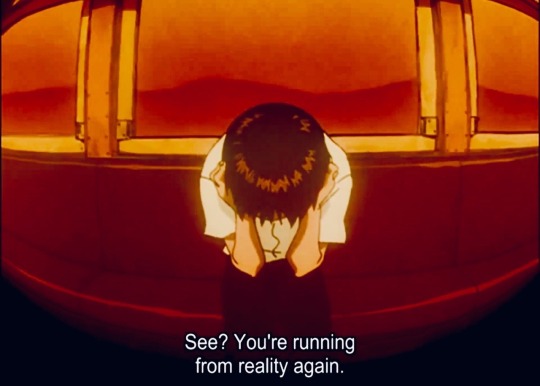


Granted it doesn’t have the same thematic gravity as Eva- and Shinji has this dream multiply times in multiple contexts- but I love the subtle hint to Eva fans that Raphael is obviously having a dilemma of sorts. Plus it’s an interesting juxtaposition of character: Shinji is someone who’s indecisive and desperate, while Raphael is the headstrong leader type. I think it’s mostly meant as a loving parody, but there is some truth to it. Dream Splinter keeps telling Raph that the truth is in him; Shinji was always having convos with his inner self (the one who percieves/the one who is perceived blah blah) or an angel.
Also there’s a lot of heavy-handed Freudian psychology in Eva a la Shinji’s relationship with his dad, which contrasts nicely with Rise Splinter’s relationship to his sons (which is a whole other can of worms). However, in Raphael’s dream, his father is spouting all this absurd bullshit that makes him go like... ‘actually nevermind lol’. His interpretation of what’s expected of him is thrown away because it doesn’t reflect reality, what he ACTUALLY needs to do (protect his family/the city/ the world). Shinji, as a character, was always looking to others to find his purpose initially (and comes to a similar conclusion much later lol). So not only is it an interesting reference, it explains the same theme in like a millisecond.

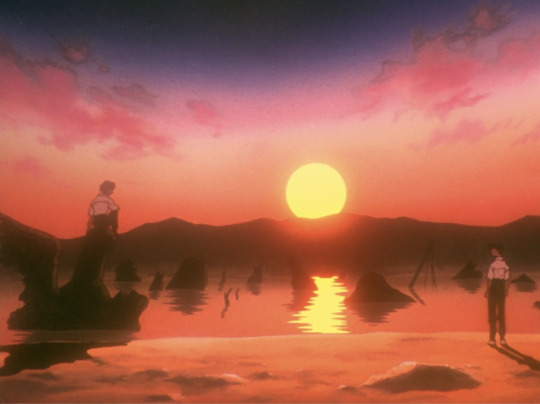
Generally, both scenarios bring up the subject of identity: who are you? who do you want to be?
#‘youre overthinking it’ hm. maybe so#also raph technically pilots an eva when he uses his tonfa power? just saying#not dunking on how nge executes that theme i just think its interesting#rise of the tmnt#rise of the teenage mutant ninja turtles#rottmnt#rottmnt spoilers#nge#neon genesis evangelion#me talking
34 notes
·
View notes
Text
(NGE spoilers) are they...are they called evangelions because it's like. technically it means "good news" but the word for news comes from angel so it's like. it means "good angel" and theyre supposed to be good versions of the angels. stupid
15 notes
·
View notes
Text
Lets Talk About Neon Genesis Evangelion... And Why I Love It (With Pictures!!!)
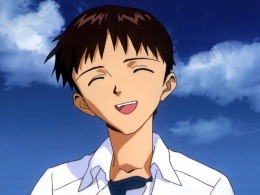
Not a lot of people are going to read this and that’s okay. I have a problem, when it comes to getting attached to shows. The problem is I get REALLY attached. Like, I get emotionally invested in characters, locations, events, lore, everything. I’ve found that writing about a show, and how it makes me feel, helps me ease off this attachment.
Spoilers for the show below, even though its been out for longer than I’ve been alive.
So, I just watched the Netflix dub of NGE. This after seeing both the original Japanese dub, and the original English dub, and loving both of them. Generally, I liked the Netflix dub. I think the voice acting and dialogue has significantly improved in most areas. I’m not entirely sold on Shinji’s new voice actor, although they did such a wonderful job. I just think once you’re used to Spike Spencer as Shinji, its hard to hear it any other way. I have a few gripes though:
1. The pronunciation of NERV... I know... I know... it was changed to be closer to the German pronunciation meaning “soul” but “Nayerve” is as ugly as “moist”. It will always be “Nerve” in my heart.
The removal of swearing. In Japanese there is no swearing, so in the spirit of bringing the dub closer to the original, they removed it. However this is jarring in some spaces. “I’m the lowest of the low.” and such.
The removal of the gay subtext in episode 24... we’ll get to this...
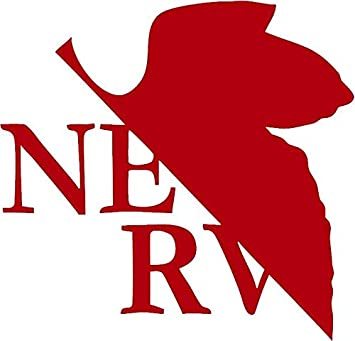
So Moving on: EVA may not have been the best show to watch while locked up because of the ongoing pandemic. Like I said, I get ATTACHED, and this show, perhaps better than any other takes all the characters and locations you’ve grown to love... and it fucking destroys them. No mercy, at all. You like this character? That’s cool BOOM they’re gonna get emotionally destroyed just as things start going right in their life.
Nowhere is that better exemplified than in Shinji. Now this is a character I really relate to. Much in the same way as him, my relationship with my father was tumultuous at best, and down right abusive at worst. I joined the army to get away from it. I guess you can say the army was my NERV, but instead of a giant purple robot (although its not actually a robot, that’s not important), I got a gun and got to sit in the desert for a few years.
Shinji sells me so hard on this series. Its easy to say hes a wimp, or a weakling, or a baby, and that’s all well and good. However if you want a ra ra action series, go watch Gundam or something. Shinji is a person, a flawed person. But a well written, understandably flawed person. He’s spent his life abandoned, and struggles to make connections with the people around him.
I’m going to Largely skip over talking about Rei, Auska, and Misato, because they too have all been analysed at length by people far more qualified than me. Needless to say, I love them all for different reasons. Particularly Misato, the troubled parental guardian. Shes an incredible leader and especially for the 1990′s, she’s a fantastic female character.
What I will go into though, is EVA’s numerous side characters who I love dearly. Particularly one (1) boy:
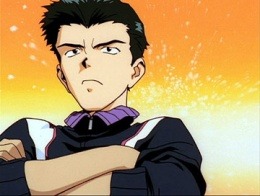
I would die for this boy, and in Evangelion fashion, I would’ve had to.
Everyone, from the 3 officers that work under Misato in operations, to Shinjis Classmates Kensuke and Toji (Toji seen above), to deputy commander Fuyutsuki, Dr. Akagi, are all fleshed out, interesting characters who I love in their own right.
Toji in particular, “the jock with a heart of gold” is introduced at first, as a sort of antagonist. The first thing we seem him do is punch Shinji in the face. However, this wasn’t just in the name of being a dick, it was because (unknowingly) Shinji had injured his sister while battling the angels.
Skipping over some (excellent) character development, they become best friends and low-key, I shipped it. From there, he goes on to become an EVA pilot just like Shinji, but after his start up test, his EVA loses control. Infected with an angel, it goes on a rampage. Against his will, Shinji is forced to put down the EVA, severely injuring Toji. In the original draft, Toji was going to be killed in this incident, and instead got off “easy”... only losing a leg. I’m skipping over alot of detail here, but chances are if you’ve seen the show, you know whats up. If not, go watch the goddamn show.
At this point the show doesn’t pull punches. In fact, episodes 16 onward are known for being gut punch after gut punch, breaking our characters down, and only partially rebuilding them. Some never recover at all.
All of this continues until episode 24. This episode left me a mess... and that’s all before Kaworu even shows his face.
For context: all of Shinji’s friends are gone, evacuated. The thriving, vibrant metropolis of Tokyo-3 has gone from this:
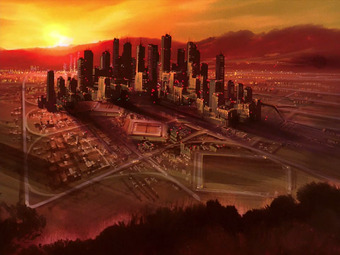
To this:
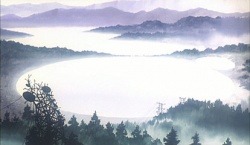
Annihilated. All of it. The world we built up, gone. And there alone Shinji sits, at the empty pit that used to be a city... and he runs into Kaworu. In the white haired boy he makes a friend, his only one in the weeks after the city was obliterated. In the original English dub (here comes the controversy) Kaworu is the first person to tell Shinji that he is loved, and worthy of being loved.
This is huge! its a small glimmer of hope for someone who has just been crushed over, and over again. Now in the Netflix dub, this line is translated as “you are worthy of my grace”. Did it bother me? yeah. Was I able to look past it? also yeah. In the end it did the same for me.
However none of it is meant to last... Kaworu was an angel all along, and finally in what is technically the last episode of the series, after shinji has lost his friends, his home, any chance of a positive interaction with his father... he is forced to kill the one person who loves him.
FUCK
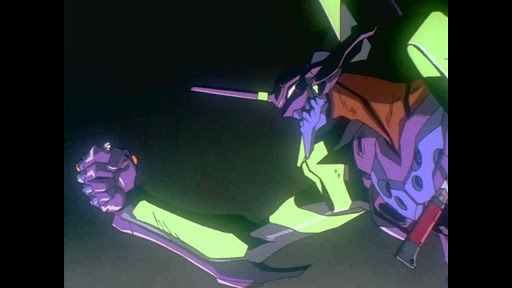
So episodes 25 and 26. I recommend everyone sit through them at least once. They help break down whats going inside shinji’s head during some key scenes in the movie: End of Evangelion.
End of Evangelion takes that destruction of everything Im attached to I keep mentioning, and dials it up to 11. We watch Nerv personnel get mercilessly gunned down, burned alive, or turned into fanta against their will. We watch Auska get horrifically ripped apart at the hands of the Mass Produced Evangelions... and we watch the horrifying destruction of humanity in perhaps my favorite concept for the end of the world... ever.
And after all of that... all of it... what happens at the end is mostly up for interpretation. Leaving me, tired, isolated, and bored, to spend my days thinking endlessly about this masterpiece of a show, its characters, and its world.
Listen, if you made it this far into my rant, thank you and I’m sorry. I definitely needed to get this all out of my system.
God’s in his heaven, all is right with the world
12 notes
·
View notes
Text
I Need You: Why Evangelion Still Matters

If you’re even a casual fan of Japanese animation (colloquially known as anime) you’ve probably heard of a few classics held up as the best of the medium; films and television shows whose place in the history of Japanese culture is widely regarded as secure: Akira, Cowboy Bebop, Ghost in the Shell, Spirited Away, to name a few of the most prominent. They all have their critics, but few would dispute their place as landmarks of the industry. But there’s one classic piece of Japanese animation however whose legacy is far more contentious and which sparks controversy even today. Like the aforementioned pieces it’s well-known and has been watched by many, but unlike them it remains quite controversial, beloved by some and derided by others.
I’m talking about Neon Genesis Evangelion,¹ Hideaki Anno’s 1995 post-apocalyptic series about teenagers who pilot giant robots (known as mecha) in a war for the survival of humanity. And in my opinion it’s actually one of the best and most important television shows of all time, animated or not.
(Spoilers ahead, though I’ll try to keep major revelations to a minimum.)
I realize that in making my claim, I’m setting myself up for criticism. The value (or lack thereof) of Neon Genesis Evangelion has been one of the most heated debates in anime fandom for decades. But even on the purely objective level of its influence on the animation industry, both in Japan and beyond, NGE and its subsequent spin-offs, sequels, and re-imaginings is a significant work worth consideration. Although the show is decades old now (the first episode aired October 4, 1995), I believe it’s still worth examining why the show’s so acclaimed and why, in my opinion, it’s still relevant today, in no smal part because of the lessons it still has to teach us about self-acceptance.
(An earlier version of this essay was posted 4 years ago here.)
Weaving a Story
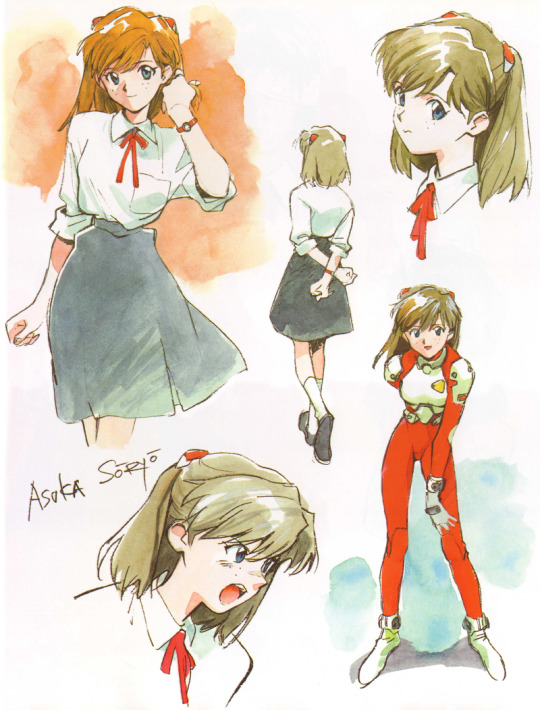
Concept art for Asuka Langley Soryu, the Second Child
Today, Evangelion is a major franchise, incorporating films, comics, video games, and more. But it all started with one TV show, Neon Genesis Evangelion, created by Hideaki Anno for Gainax. Even from the start, NGE was somewhat exceptional. In the early-to-mid 1990s when it was produced, most of the major animated shows on air (both in Japan and America) were heavily merchandise-driven and sponsored by either toy or video game companies. Nearly all were owned by a major studio like Toei or Toho. Conceived of by a single individual and owned by a small creator-run studio, Neon Genesis Evangelion was highly unusual and something of a creative risk.
The story of Neon Genesis Evangelion is, on first glance, nothing remarkable for Japanese animation. A group of teenagers are recruited by a unified global government to pilot giant robots (mecha) in a battle for the survival of humanity. In the process they have to face not only their deadly adversaries but also learn how to work together as a team, overcoming their many differences and personal issues. Gundam, Macross, and Hideaki Anno’s own Gunbuster had all covered similar territory before. But where NGE would go with its premise was far stranger, blending the well-tread concept of adolescent soldiers with theological imagery, Freudian and Lacanian analysis, and abstract writing that soon set the show apart from its contemporaries.
The show quickly caught the fascination of viewers. While Neon Genesis Evangelion started initially with solid but unexceptional ratings, it soon expanded into a massive pop cultural phenomenon as more and more people tuned in to find out what all the fuss was about, eventually reaching 25-30% of the targeted demographic.² The final two episodes, noted for their abstract nature and for seemingly leaving several plot threads hanging, prompted a highly polarized reaction. The follow-up movie The End of Evangelion, released a year later, divided audiences even further. As a consequence, despite Evangelion’s immense popularity and influence, the franchise remains one of the most controversial works to ever air on broadcast television.
Neon Genesis Evangelion’s ending was, however, just one of its controversial aspects. Moral guardians raised complaints about the show’s frank (and frequently bleak) depictions of sex, violence, and mental illness, demanding networks censor its content. Critics such as Eiji Otsuka and Tetsuya Miyazaki accused Anno of “brainwashing” his audience and affirming, rather than criticizing, anime fans’ escapist tendencies. Yoshiyuki Tomino, the director of both Gundam and Ideon, complained that Anno tried “to convince the audience to admit that everybody is sick” and that it “told people it was okay to be depressed.” Additionally, much was made of the show’s religious imagery, particularly due to the then recent sarin gas attacks by the Aum Shinrikyo cult, which like NGE utilized a blend of Western and Japanese religious imagery.
Other complaints centered on NGE’s main characters, many of whom were found to be unlikeable or unheroic. Many attacked the lead protagonist Shinji as weak and indecisive, unbecoming of the hero in a show aimed at adolescents. Some further asserted the character was an attack on the show’s audience and that Anno wanted to “punish” his audience for their anime-loving ways. The rest of the cast didn’t escape criticism either and were variably found to be cruel, schizophrenic, or perverse. All could easily be characterized as dysfunctional.
But despite the backlash against Neon Genesis Evangelion, whether it was centered on the show’s ending, its thematic elements, or its characters’ deficiencies, none of it seemed to put a lasting dent in the show’s influence or popularity. And a lot of that, perhaps, has to do with the time in which it emerged. At the time NGE was originally produced in the early to mid 1990s, Japan was in the midst of an extended economic downturn that would come to be known as the Lost Decade, following a major asset price crash in 1989. During this time, Japanese animation, like many industries, experienced a contraction, resulting in slashed budgets and an increasing reliance on merchandising and product placement to sustain both the studios producing the content and the major networks who broadcasted (and often owned) it.
In addition to these economic concerns, there was also a growing feeling in the 1990s that animation was a thing of the past, whose glory days were long gone and which only inspired passion in either adolescents or callow, sheltered men in their 20s or 30s. The content of most anime was regarded as puerile or derivative and hardly becoming of serious adult interest. The term otaku,³ a word that literally means “house” but was used to mean “shut-in,” quickly became shorthand for anime fans who spent their adulthood collecting memorabilia and memorizing lines from their favorite shows.
But Neon Genesis Evangelion helped to change all that and to reclaim anime’s respectability. Breaking through the traditional animation fandom to a wider audience and owned solely by the creator-run Gainax, NGE was an invigorating shock to the industry, shaking it up and reviving interest in what had been regarded as a dying medium. Within a few short years, new creator-owned studios were cropping up across Japan, a trend which would continue well into the next decade and bear such fruit as Bones, manglobe, Ufotable, or Gainax’s own offshoots Trigger and Khara. The animation industry was expanding again and was beginning to boom overseas, in no small part thanks to the popularity and notoriety of NGE.
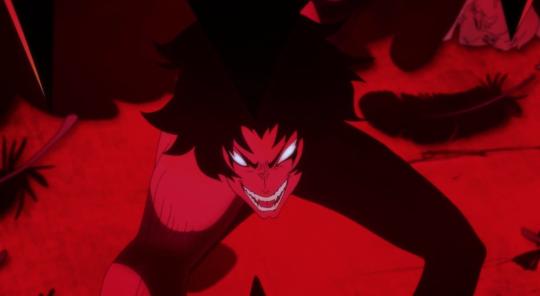
Devilman: Crybaby by Science Saru, a series itself based on one of Evangelion’s chief influences
The new anime boom would also reflect its origins in a number of different ways. More than a few of the new shows to debut in the late 1990s and early 2000s were directly influenced and impacted by Neon Genesis Evangelion, including such notables as RahXephon and Revolutionary Girl Utena. More subtly, the starkly realistic depictions of violence and sexuality in NGE as well as its bizarrely surreal imagery encouraged many directors to try similar techniques, resulting in a shift in style throughout the industry.
Neon Genesis Evangelion’s influence on later anime can be attributed in some ways to its technical sophistication. At its most basic, visceral level, NGE was startling to look at. Even compared with other Gainax works that had come before it, like Nadia: The Secret of Blue Water or Gunbuster, NGE immediately stood out as something unique in an increasingly homogeneous industry. The character designs of Yoshiyuki Sadamoto, strangely subdued yet striking and expressive, helped distinguish the cast while Ikuto Yamashita’s monstrous and biomechanical designs for the Evangelions did the same for the show’s mechs. Combined with the intense direction of Hideaki Anno, Kazuya Tsurumaki, Masayuki, and others NGE drew the eye right from the start.
The technical splendor wasn’t just limited to NGE’s art design or animation either. The voice talents provided by performers like Megumi Ogata, Kotono Mitsuishi, Megumi Hayashibara, and Yuko Miyamura gave life to the characters and helped audiences empathize with them, despite their dysfunctional and emotionally-wrought nature. Also contributing to the audio portion of Neon Genesis Evangelion was Shiro Sagisu, whose music swung significantly from jazzy to melodramatic and even to surreal, changing and evolving to match each scene with an appropriate mood. Assisting Sagisu was the vocal work of artists such as Yoko Takahashi, who made the show’s central theme, “A Cruel Angel’s Thesis,” a pop sensation.
But while the technical triumphs of Neon Genesis Evangelion certainly contributed to the show’s lasting appeal and influence, they’re hardly the whole story. For many viewers, the appeal of Evangelion went well beyond the surface, to narrative and thematic elements they felt spoke directly to them. Indeed, it is arguably NGE’s complex characterization, unorthodox narrative structure, and thematic depth which have made it stand out as one of the most legendary examples of Japanese pop culture.
A Cruel Angel’s Thesis
It’s not an exaggeration to say that essays—and books—have been written about Neon Genesis Evangelion and its thematic qualities. Most of this has been concentrated in Evangelion’s own native Japan, but the sensation has breached the other side of the Pacific as well, resulting in comparisons to the works of David Lynch and other Western directors. Contributing to this no doubt has been Anno’s own numerous references in NGE not only to native Japanese culture but to the West as well, with tributes to works like 2001: A Space Odyssey, The Andromeda Strain, and UFO found frequently throughout.
The most obvious thematic element present in Evangelion, at least to Western eyes, is its frequent allusions to Christianity, Judaism, and Islam. It’s not hard to see why: the monstrous foes besetting humanity are “Angels” who shoot cross-shaped energy bolts, which the main characters fight with “Evangelions” (the Greek word from which “evangelism” derives). Coupled with other bits and pieces here and there referring to original sin, the will of God, and ancient Judaism, these details give Evangelion a strikingly religious appearance to Western viewers.
However, while they’re certainly the most obvious elements in Evangelion, the religious references are also easily some of the most transient and insubstantial. Although initially viewed as central to the plot by many Westerners, it has since been revealed that most of the Biblical references are there for styling rather than substance and were largely intended to make the show stand out. In many respects, the usage of the Abrahamic faiths in Evangelion is similar to the use of Buddhism in The Matrix or Egyptian mythology in Stargate: a bit of fun exoticism to keep things interesting.
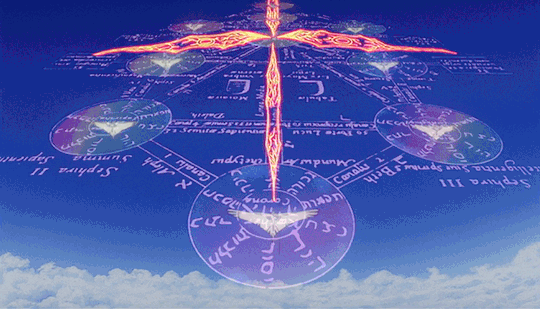
The Sephirot from Kabbalah, as represented in The End of Evangelion
That being said, the religious themes are not as vacuous as is sometimes alleged and the sheer number and obscurity of some of them indicates some real effort on the part of Anno. Each of the Angels, for instance, (which are called shito⁴ in Japanese, meaning “messenger” or “apostle”) are named after actual angels from Abrahamic mythology and their names, when translated from Hebrew or Arabic, often do indicate their nature in some way (e.g., Arael’s name means the “light of God” and it is an enormous winged being who attacks the characters with a beam of light). And while the use of the Kabbalah’s Sephiroth may be perfunctory, many other references to Jewish mysticism appear more meaningful, such as the Chamber of Guf or the duality of the Trees of Life and Wisdom.
Less obvious to Western eyes but possibly even more sophisticated are the references Evangelion makes to non-Abrahamic religions. There is, for example, the notable similarity between what the show terms “Instrumentality” and traditional descriptions of “egoless” nirvana in Buddhism (a religion also referenced by way of the Marduk Institute’s 108 dummy corporations).⁵ Japan’s native religion Shinto also shows its hand, most notably through the depiction of the Evangelions themselves, which Anno consciously designed after the monstrous oni of Japanese legend. All in all, while he may not have intended to portray a particular theological message, it’s clear that Anno put a lot of thought and research into giving Evangelion a suitably mystical appearance.
However, obsessing over the religious imagery in Evangelion obfuscates something far more important: Evangelion isn’t really about religion. Rather, where Evangelion’s thematic depth and complexity most clearly comes into play is psychology and philosophy of the mind.
Neon Genesis Evangelion is often described as a deconstruction of mecha anime. To a large extent that’s true, but it’s deconstruction is specific in outlook, focused on the psychology of its characters in the form of a question: just what kind of people would put the fate of humanity in the hands of adolescent children? And just what would that kind of stress and responsibility do to a child’s mind? In that regard, NGE is in far closer in kinship to Ender’s Game than to its natural predecessors like Macross, Gundam, or Gunbuster.
When the story of Neon Genesis Evangeliom begins, the world has already experienced disaster on an unprecedented scale. 14 years before the show begins, a massive apocalyptic event called the Second Impact devastated the Earth’s climate, precipitated global nuclear war, awakened the monstrous Angels, and resulted in the deaths of half of all humans on the planet. In response, civilization has been restructured and militarized in anticipation of an even worse Third Impact threatened by the Angels. To combat this threat, the secretive organization Nerv assembles biomechanical monsters of their own (the Evangelions) which, as it so happens, can only be piloted by teenagers.⁶
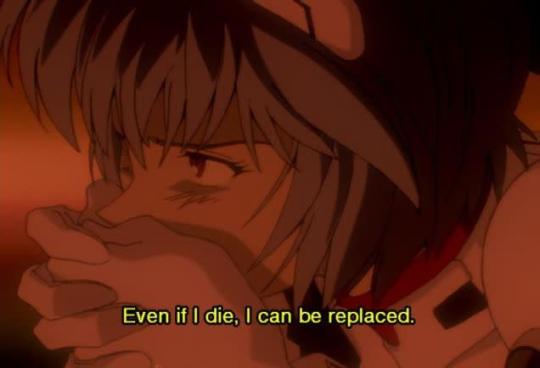
Rei Ayanami, the First Child, believes that her life is expendable
This is the kind of world people like Misato Katsuragi, Gendo Ikari, and Ritsuko Akagi live in and it’s the severity of their situation which ultimately shapes their actions. Although many of the adults, particularly Misato, wish they could let the series’ child protagonists lead a normal life, they know that’s not an option. As a result, the adult characters are driven towards a cold pragmatism that means, no matter how warm or compassionate they may act towards their wards at any given time, they’re still ready to sacrifice them when necessary.
This ruthless approach has its costs, however. The constant pressure to succeed, alongside the emotional whiplash they receive at the hands of the pilots’ supervisors and the repeated trauma they experience in combat results in each pilot’s gradual psychological degradation. Beginning as relatively competent and capable (if slightly dysfunctional) individuals, each pilot eventually succumbs to their trauma and breaks, causing them to isolate themselves from one another and resulting in a breakdown in morale which puts not only themselves but humanity itself at risk.
In keeping with this theme of psychological frailty and the ways in which we as people both intentionally and unintentionally harm those we care about, including those we care about, the series makes numerous allusions to the work of past psychologists and philosophers. Many concepts are mentioned specifically by name, such as the “oral stage,” “separation anxiety,” or the “hedgehog’s dilemma,” while others are alluded to more subtly, such as the Oedipus and Elektra complexes, post-traumatic stress disorder, schizophrenia, or Lacan’s dichotomy of the constructed and ideal selves.
Hideaki Anno has himself said he researched psychology both before and during the production of Neon Genesis Evangelion and that many of the show’s characters are based upon both these concepts and his own experiences. He has, for instance, described the protagonist Shinji as a reflection of his own conscious self, while the emotionally withdrawn Rei is a manifestation of his unconscious, and the enigmatic Kaworu is his Jungian shadow. Altogether, the works of Freud, Lacan, Schopenhauer, Hegel, Jung, and Sartre have all been identified by staff or critics as influences on the show’s characters and plot.
One of the chief psychological themes in Evangelion is abandonment, particularly by those you love or have been cared for by. Throughout the story—in its past, present, and future—each of the main characters is abandoned by people important to them: their parents, their guardians, their lovers, their friends, etc. Invariably, this abandonment leads to a breakdown in identity and self-confidence, as each character is forced to redefine themselves from within after devoting so much of their identity to how they were perceived by others. Thematically matching to this issue of personal abandonment is humanity’s own abandonment by their unknowable creator eons ago, a detail alluded to occasionally as the story progresses. Like the individual characters then, humanity must learn how to manage and master its own fate when it has no one left to depend upon.
The Hedgehog’s Dilemma
These themes, however, would have little resonance were they irrelevant to the show’s human drama. It is to Neon Genesis Evangelion’s credit that they are not; each of the characters represent the show’s themes in both significant and personal ways. It is quite arguable then that it is the show’s protagonists, however controversial they may be either as individuals or an ensemble, which have truly allowed NGE to endure for decades as an icon of Japanese pop culture.
The most important of Neon Genesis Evangelion’s characters by far is easily Shinji Ikari, the pilot of Evangelion Unit-01 and the son of Gendo Ikari, the enigmatic director of the Evangelion program. At the beginning of the series Shinji is called to Nerv by his father, who abandoned him years earlier following the death of Shinji’s mother. Shinji hopes that this sudden call is for the purpose of reunion, but he is quickly disillusioned when his father reveals to him that he needs Shinji to pilot one of the monstrous Evangelions he’s built—a machine Shinji has hitherto never heard of—and to save humanity from extinction. Brokenhearted by his father’s coldness and terrified of the task he’s been blackmailed into performing, Shinji puts off his own desires and self-identity aside for the sake of pleasing his father and others, becoming the so-called Third Child.

Series protagonist Shinji Ikari, the Third Child
Shinji’s a complicated character and one many find difficult to empathize with. He is self-consciously cowardly and phlegmatic, prone to self-criticism, and afraid of getting close to others for fear that they’ll reject him. At times he thinks seriously about running away from his responsibilities, but whenever he actually does he quickly returns, unable to commit to so blatant an act of rebellion for long. Despite this and despite his own reliance on others to define his value, Shinji does have his virtues: he’s thoughtful, easy to get along with, and proves remarkably skilled at piloting, even if he has no real passion for it.
Shinji’s commanding officer, Misato Katsuragi, is NGE’s most prominent adult character and (according to Hideaki Anno) the series’ deuteragonist.⁸ Loud, goofy, and irreverent, Misato strikes quite a different first impression than Shinji, but despite their outward differences they’re actually quite similar people with comparable issues, merely approaching them in different manners. Like Shinji, Misato feels abandoned by her father, who neglected her and her mother before his death years ago. But despite that Misato still yearns for his affection, manifesting her desires in the form of her relationship with Ryoji Kaji, a coworker and lover she admits resembles her father. And, also like Shinji, Misato fears getting close to other people for fear of being hurt, but whereas Shinji manages his anxiety by avoiding people, Misato does so by acting flippant and flirtatious in public, living lightly and maintaining only “surface level relationships.”
Shinji’s move into Misato’s apartment comes largely at her insistence and Shinji is initially quite uncomfortable with it, a feeling which does not subside when he learns she’s an extremely messy housekeeper and an alcoholic. But despite her irreverent personality, Misato turns out to be a deeply caring person who wants very much for Shinji to be happy and, over the course of the series, she tries to direct the development of Shinji as a good parent would, all the while concerned her own flaws make her an unsuitable guardian. Notably, these moments where the two of them bond are some of the most light-hearted in the series.
Although Shinji is the first pilot the series introduces, he is preceded by two others at Nerv. The first, Rei Ayanami, is arguably Neon Genesis Evangelion’s most popular (and certainly influential) character. Enigmatic and asocial to a degree that goes beyond mere awkwardness, Rei lives alone in a desolate apartment she doesn’t even bother to clean, close to no one but her pseudo-guardian Gendo Ikari. Because of her closeness to his father, who has raised her as his own daughter, Shinji initially sees Rei as a replacement for him. It soon becomes apparent however that Rei’s trust and faith in Gendo go well beyond that of a healthy parent-child dynamic. Obedient to a fault and unconcered for her own well-being, Rei causally throws herself into danger for Gendo and Nerv and comes across as emotionless to those around her.
But beneath Rei’s cold, ultra-stoic exterior beats a heart as capable of joy and sorrow as that of any other. Far from the robotic doll many assume her to be, Rei has a secret yearning for others to understand her and her them and, over the course of the series, slowly opens up to Shinji. But although she desires human contact, she doesn’t really know how to initiate it and she’s terrified of the possibility that there’s something about her that makes her fundamentally unlike other people.
Asuka Langley Soryu, the third of the child protagonists to show up,⁷ strikes about as strong a contrast to Rei as one can imagine. Egotistical, loud-mouthed, and possessed of far more bravado than either Shinji or Rei, Asuka joins the cast about a third of the way through the show, after transferring from Nerv’s facility in Germany. Raised since childhood to be a pilot, Asuka prides herself on her skills and looks with disdain on Shinji’s self-deprecating nature and inability to recognize his own accomplishments. Already a college graduate and convinced she’s as much an adult as anyone, Asuka also proves precociously sexual, pining for both Misato’s lover Kaji and, to a lesser but still significant extent, Shinji himself, whom she frequently teases for attention.
Asuka is like Shinji a controversial character; people often look at Asuka and see one of two sides to her: a selfish jerk who bullies Shinji and Rei or an accomplished young woman whose confidence and inner strength makes her the real hero of the show. The truth, however, is that in many ways she’s both. Asuka really is brave—far braver than Shinji or even Rei, who doesn’t really fear death—and she’s definitely skilled. But she’s also prone to jealousy and vindictiveness, as well as a consciously manifested attitude of not caring for anyone. In many ways, however, her bravado is a cover for own insecurity, built upon the belief that no one really likes or loves her.
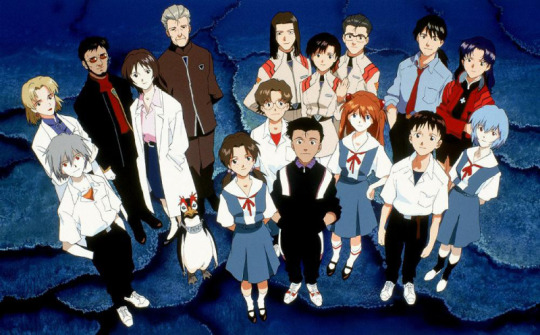
The cast of the original Neon Genesis Evangelion
There’s a lot to admire about NGE’s characters, even with all their flaws and personality disorders. It’s easily got one of the most complex and diverse casts in anime and there has to be something said for the fact that of its four principal characters, three are female, allowing it to easily pass the Bechdel-Wallace Test (which it does). The characters each have their own virtues, which in a more easygoing series could make them quite endearing. Lead protagonist Shinji’s selfless and has a fairly noble streak, though it’s hidden deep beneath his own self-doubt and loathing. The adult Misato’s fairly protective of her young charges, at least insofar as she is allowed to be given the circumstances, and is also quite a bit more capable than many expect. Selfless Rei’s loyalty and discipline easily make her one of the most sympathetic characters in the series, even if she does sometimes come across as alien or inhuman. And there’s little question that the daring Asuka has enough chutzpah for the whole cast.
But it could also be argued that the complexity and harshness of NGE’s characters which ultimately make them work, even if at times they also make the show hard to watch. Shinji, Misato, Rei, and Asuka are not the idealized paragons of humanity you’d expect to find in most television shows aimed at teenagers, but they’re not the imaginings of a bitter misanthrope either. They’re deeply flawed, yes, and when they’re hurt they keep on hurting, but they also keep going and keep trying to find a way to live with others that doesn’t result in pain. It’s this idea, the recognition that people screw up and hurt one another but want to do better, that really enlivens the franchise. For all the reputed darkness of Evangelion’s story, it is in many ways idealistic, always hopeful that it’s characters might find a way to be happy. You don’t have to be broken, it says, even if you are damaged.
And it is that core ethos of qualified hope that elevates Neon Genesis Evangelion from just another mecha anime or even a deconstruction of mecha to something more. Something sublime and, in its own strange way, even inspirational.
The Sickness unto Death
At this point I feel it’s useful to provide some personal background. I first watched Neon Genesis Evangelion when I was in high school, sometime between my third and fourth years. My initial reaction was, I think, largely typical. The first episodes interested me and as the storyline moved forward and became more complex, I became more invested in the show’s events and characters. I even appreciated to some extent the bizarre and abstract final two episodes, though I’d hoped for a more conventional ending. Then, I watched The End of Evangelion, whoch left me shocked and dismayed at its harshness. I still cared about the series, but I felt more ambivalent as a result.
Over the next few years I continued to keep up with the Evangelion fandom to a small extent, checking out the rumors about the new movies and reading some fan fiction online, but I gradually drifted away. None of the fan speculation or fiction really seemed to scratch the same itch the original series had and eventually my interests in anime shifted more towards Ghost in the Shell: Stand Alone Complex and Fullmetal Alchemist. Evangelion, as much as I’d enjoyed it before, fell gradually into the background of my life.
And then I entered college.
In my youth, I was generally regarded as a “bright” student, fawned over by teachers and regarded by my peers as either a genius or a “know-it-all,” depending on how much they liked me (or didn’t). As I entered the final years of high school it was clear that I was expected to excel in university. But when I actually began my college career I quickly faltered. Depressed, socially isolated, and exhausted from getting four to six hours of sleep a night, my grades slipped quickly and my social life evaporated. For awhile, I tried to deny my problems and ignore them, believing I could power through without help. Eventually, though, I had no choice but to confront my issues: I was put on academic suspension and my financial assistance was pulled.
I was devastated. I had no idea what to do. I didn’t know how to tell my parents, who I’d let believe I was doing fine. I didn’t know where to go with my life now that I’d failed to live up to the expectations I’d allowed other people to put on me. I didn’t even really know who I was anymore. If I wasn’t a brilliant student and child genius, who was I? In my own eyes I was worthless and contemptible.
Eventually, with the help of my family and friends, as well as staff from the university, I was able to make my way back to daylight. I began to undertake counseling. I went to community college to bring my GPA back up. I started talking more openly with my loved ones about my problems, even though I was worried it would make them think less of me. And I began to be more honest about my flaws and limitations.
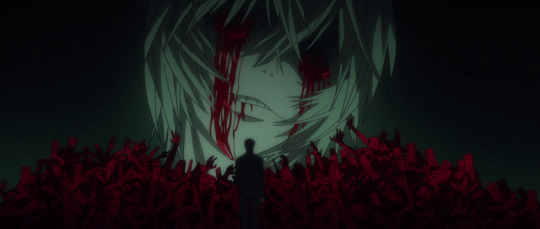
A scene from Evangelion 3.0: You Can (Not) Redo, the third Rebuild film
It was also around this time, rather coincidentally, that I began to seriously revisit Evangelion. I was prompted, as much as by anything else, by the release of the new “Rebuild of Evangelion” films. After my brothers and I attended a screening of the second film’s release in early 2011 with several of our friends, the latter (hitherto unfamiliar with Evangelion) expressed interest in catching up with the franchise. Indulging them, my brothers and I rewatched the original TV series. To my surprise, I began to see the series in a new light. Where once I had simply been sympathetic to Shinji, Misato, Rei, and Asuka’s inner turmoil, now I felt deeply empathetic. Where previously the show’s harshness had at times alienated me, now it felt deeply relatable and truthful. And where earlier the TV show’s decision to focus on the internal psyches of its main characters instead of the plot had puzzled me before, now I felt as if I understood it completely. I even began to appreciate the theatrical finale, a film so brutal some regard it (falsely) as Anno’s revenge against fans angry with him for the original ending.
What had changed? Certainly not the show. Rather, it was my perspective. I possessed now of a viewpoint I hadn’t held earlier. I knew now what it was like to be full of contempt for one’s self, to be a defeated shell of a person who felt as though their value was slipping away or was already entirely absent. I knew what it was like to believe I was a failure in every meaningful way. In other words, I’d gained the perspective of a person suffering from depression. The same perspective as that of Evangelion’s principal characters as well as their creator, Hideaki Anno.
It’s hardly secret knowledge that Hideaki Anno was suffering from depression when he first created Neon Genesis Evangelion. The extent of his depression, however, was far graver than is generally recognized. When Anno began work on the project that would become NGE, he had already been suffering from severe depression for at least four years. In a statement released with the first volume of Evangelion’s manga (comic) adaptation Anno described himself as “a broken man... who ran away for four years, one who was simply not dead.” And while the production of NGE had originally been intended to break him out of a rut, the stress only compounded the severity of his condition. By the time of the show’s completion Anno was, by his own later admission, borderline suicidal.
No one’s ever said precisely what drove Anno over the edge publicly, but it’s widely agreed it had much to do with the production of his previous work, Nadia: The Secret of Blue Water. Originally conceived by Anno’s mentor Hayao Miyazaki in the mid-1980s Nadia was eventually handed off to Anno after Gainax made a bid for the project. Far gentler and family-friendly than NGE, the comparative sweetness of Nadia obscured a troubled production that saw animation work outsourced and Anno frequently butting heads with NHK, the series’ broadcaster, over the show’s content and creative direction. Coupled with rumored trouble in Anno’s personal life, the experience proved too much for him, driving him into the deep depression that would haunt him for most of the 1990s.
The roots of Anno’s emotional troubles may go deeper, however. Long regarded by those close to him as a lonely and eccentric oddball, Anno was socially withdrawn as a child, preferring to spend his time watching and recreating scenes from his favorite anime and tokusatsu to interacting with others, a choice he’d later say he regretted. In 1983, due in large part to his social isolation and inactivity at school, he dropped out of university and lived homeless for a time before he was discovered by Miyazaki and employed as an animator for Nausicaä of the Valley of the Wind. The experience proved vital to his career and soon afterward he and a few friends gathered to form Gainax, their own animation studio. It was during this time that Anno directed Gunbuster alongside working on other projects such as Royal Space Force: The Wings of Honnêamise and Grave of the Fireflies. For a time, he seemed happy. But then came Nadia and he withdrew entirely from his work and social life, before reemerging to work on Evangelion.
Anno’s turbulent life and emotional turmoil is reflected in the characters of Evangelion, many of whom enter the story damaged but apparently functional only to completely fall apart later on. Shinji is lonely and dependent when he first appears, but he still manages to form friendships and do what’s required of him. Misato may be an alcoholic with a mess of a home, but Nerv’s trust in her is rewarded time and time again by her effectual planning and coordination of her pilots. Rei’s cold and emotionally withdrawn, but her dutiful selflessness both inspires and attracts others to her. Asuka can be arrogant and reckless, but she’s also intelligent and capable of real kindness towards those she respects. Like Anno in the early days of Gainax, they all seem to be on top of things.
But just when it seems like the team’s getting the hang of things and finding their groove, disaster strikes. Soon, as one crisis mounts on top of another, from near-death experiences to being forced to hurt his friends, everything falls apart. Shinji’s newfound self-confidence shatters and he becomes even more needy than before. Misato’s constructed domestic bliss blows apart just as her own convictions are thrown into question by new revelations about her work. Rei becomes colder and more distant than ever before, withdrawing even from Gendo, the one person she trusts implicitly. And Asuka collapses into a pit of self-loathing despair, savagely lashing out at anyone who gets close to her. It’s ugly, it’s nasty, and it’s real.
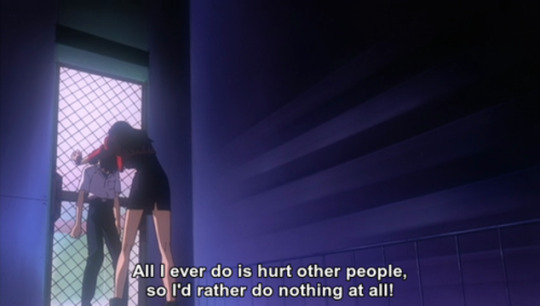
Shinji admits to his feelings of worthlessness to Misato Katsuragi, his guardian and confidante, in The End of Evangelion
This cycle of crash, despair, and recovery is not unusual for suffers of depression. Contrary to what is often thought, depression is not really something you have at one point in your life and then “get over;” it’s something that can shadow you your entire life, kept in check by momentary pleasures and good times but always threatening to surge and overwhelm you when things go awry, sending you into a spiral of self-hate and abnegation that can last for weeks, months, or even years. Friends and family help keep it in check, as does therapy and pharmaceuticals, but it never goes away completely. The only thing you can do is recognize the symptoms and do your best to confront them. You have to keep going. You can’t let your fears drive you to abandon the world. You must not, in other words, run away.
And really that’s what the characters’ struggles in Evangelion come down to: facing reality and acknowledging their flaws while also recognizing their own potential to overcome them and the painful struggle for acceptance we all, on some level, endure. The first instinct of every character in the series is to run away from their problems, to obscure them with outwardly derived duties, relationships, or purposes. Shinji and Rei both look to Gendo, Misato to her job, and Asuka to her pride as an Eva pilot, but all of them are running away and, as a consequence, are unprepared to deal with reality when it hits them flat in the face.
Or are they?
As Long As You Try to Continue to Live
It’s worth noting that when Anno created Neon Genesis Evangelion he didn’t initially set out to create a dark and cynical deconstruction of mecha anime. When asked what initially gave him the impetus to create NGE, Anno has said repeatedly that he originally meant to make a show more in the spirit of Gundam or Space Battleship Yamato, two of his favorite TV shows from his youth, but without the shackles inherent to sponsorship by a toy company, as was common practice for anime at the time. “I made Evangelion to make me happy and to make anime lovers happy,” he said in a 1996 interview, “in trying to bring together the broadest audience possible.”
But as pre-production on the series progressed (and his emotional state regressed) Anno became further disenchanted at the state of anime, concerned that fans were turning to it as a way to escape reality as he himself felt compelled to. “I wonder if a person over the age of twenty who likes robot anime is really happy,” he stated in an article for Newtype half a year before the series aired. This change in perspective, coupled with his resurgent depression, caused Anno to shift focus as he became more and more concerned with the characters’ emotional development, hoping that by the end of the series’ narrative “the heroes would change,” breaking away from their regressed emotional state and achieving the same emotional well-being and self-dependence Anno still sought for himself and which he felt his audience needed as well.
It’s this perspective of Anno’s—that anime otaku were and are caught in a kind of prolonged childhood—which has led to the impression that Anno hates otaku and believes their lives to be worthless. But the truth is that Anno’s thoughts on the subject are quite a bit subtler and more reflective than many give him credit for. Far from hating otaku, Anno counts himself among them and feels defensive whenever they’re derided by others. The issue, he thinks, is less that otaku are permanently stunted and more that they’re afraid or reluctant to open themselves to new experiences:
“I feel that otaku have already become common to all countries. In Europe, in Korea, in Taiwan, in Hong Kong, in America, otaku really do not change. I think that this is amazing. I say critical things towards otaku, but I don’t reject them. I only say that we should take a step back and be self-conscious about these things. I think it’s perfectly fine so long as you act with an awareness of what you are doing, self-conscious and cognizant of the current situation. I’m just not sure it’s a good thing to reach the point where you cut yourself off from society. I don’t understand the greatness of society, either. So I have no intention of going so far as to call for people to give up otaku-like things and become more suited to society. Only, I think there are many other interesting things in the world, and we don’t have to reject them.”
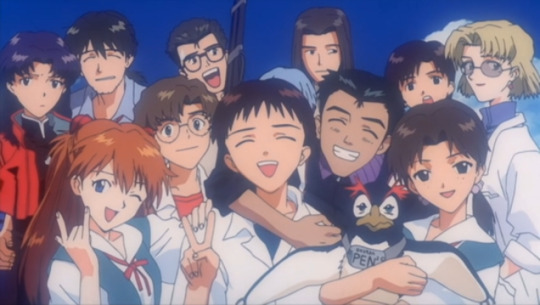
Despite everything, the characters still care for and want to see one another happy
And that’s what I mean by Evangelion’s subtle, qualified idealism. Despite Anno’s frequent cynicism and troubled state of mind during the production of the series, it’s clear that at heart he’s a person who believes people can change and improve themselves. He’s someone who believes that, even in the worst or most desperate of situations, people can find happiness if they’re open to it. “As long as you try to continue to live,” one character states in The End of Evangelion, “any place can be a heaven… there’s a chance to become happy everywhere.”
It would certainly be easy to define the characters of Evangelion by their failures and���given the magnitude of their failures—it’s understandable why many do. After all, much of the series’ narrative is caught up (as I noted earlier) in deconstructing the kind of scenario typical of mecha shows and examing what really would happen if teenagers were put in charge of the world’s salvation. As such, as in other deconstructionist narratives (such as the Battlestar Galactica reboot or Watchmen), the characters screw up about at least as often as they succeed.
That being said, more often than not, when the characters are hit with tragedy or trauma, they eventually recover and bounce back. They’re definitely damaged and shaken by their experiences, but they keep on going anyway. As much as Shinji fears and abhors piloting he’s also someone who, when people are really depending on him, will almost always get right back in the cockpit and try to help. Rei may be over-compliant and lack any regard for herself, but she’s also capable of defying orders when she knows they’re wrong. And for all Asuka’s jealousy and grandstanding, she’s also a person deeply capable of love and self-sacrifice, who would die for those she cares about.
This ray of hope at the core of Evangelion’s story is made most clear in the television series’ original broadcast ending, wherein Shinji rediscovers his own self-value and the joy of living in a world with other people and declares that, although he hates himself, “maybe, maybe I could love myself. Maybe, my life can have a greater value.” But such idealism is even found in the much more outwardly harsh vision of The End of Evangelion. After coming face to face with the world he thought he desired—a world without pain or individuality—Shinji realizes that it’s also a world without happiness. “This isn’t right,” he says. “There was nothing good in the place I ran to, either. After all, I didn’t exist there... which is the same as no one existing.” Realizing this, Shinji chooses to return to the physical world he knew, even if it means feeling pain again.
The idea that joy and pain are in many ways coterminous with one another is hardly original to Evangelion; indeed, it’s a fairly important concept to Buddhism. But I’ve rarely seen the idea expressed in quite the same way as Evangelion, in a way that’s both fully formed and strangely life-affirming. Pain is inevitable, but so is joy. You’ll be hurt, but it’s better than never feeling anything at all and may only give you more appreciation for what you have. You may feel alone, but you’re not; everyone suffers in their life at one point or another, and you don’t have to carry that burden by yourself.
Reflecting upon and considering these themes through Evangelion, as I rediscovered it during a low point in my life, allowed me to appreciate it in a way I’d never been able to before. And it also helped me to move on with my life, to accept the losses I could never recover while also believing it didn’t mean my own life was over. Like Shinji, Misato, Rei, and Asuka, I didn’t have to be defeated by my experiences. I could keep on going. I didn’t have to run away. And that’s a message I believe everyone needs to hear at least once in their life.
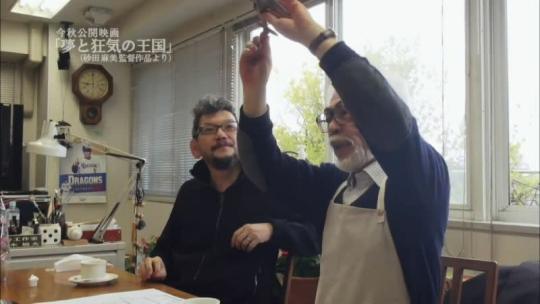
Series creator Hideaki Anno (left) with mentor Hayao Miyazaki (right)
Today, Hideaki Anno has found some peace of mind. He’s happily married, the head of his own production company, and he’s physically healthier too. He still suffers from depression—he’s not cured by any means and he probably never will be; depression isn’t that kind of disease. But he’s able to fight it now and to find the happiness he once believed illusory. He has the same hope he wanted his characters to find in Evangelion. And which I also feel I’ve found, in some small part, thanks to him.
¹Throughout this essay, Neon Genesis Evangelion or NGE refers to the original TV series, The End of Evangelion refers to its theatrical sequel, Rebuild of Evangelion refers to the series of rebooted films produced decades later, and Evangelion on its own refers to the franchise as a whole.
²Specifically, shōnen, meaning boys aged between 12 and 18.
³The term has since been adopted by Western anime fans, but in Japan the word does not necessarily refer to animation fans specifically but to anyone with an obsessive interest in something.
⁴Ironically, “messenger” is a literal translation of the word angelos from Greek—the origin of the English word “angel”—as well as the original Hebrew mal’akh.
⁵The numbers 8 and 108 are both significant in Buddhism. 8 refers to the Noble Eighfold Path to enlightenment. 108 refers to several things, including the number of beads in a Vajrayana prayer rosary, the number of questions asked of the Gautama Buddha in the Lankavatara Sutra, or the number of times Japanese Buddhist temples ring a bell on New Year’s.
⁶The reason for this is never fully explained. Behind the scenes, this was largely because of the show’s target demographic. In universe though it may be related to the secret nature of the Evangelions themselves, which have human souls.
⁷Deuteragonist is a term which means the second-most important character with whom the audience’s sympathies are intended to lie.
⁸Though referred to as the Second Child(ren) because she was the second candidate approved to pilot Evangelions, before Shinji but after Rei.
43 notes
·
View notes
Note
For the anime prompt: 1 through 5?
1. best anime you’ve watched:ik it’s an adaptation of a vn (the vn is also fucking amazing fyi) but: steins;gate absolutely no question. literally aside from the :// bit of transphobia there is (which is handled slliiiightly better in the vn imo but still not Well) it’s. fucking perfect. there’s a reason its in the top 10 on mal literally 6 years after it came out which is RARE for mal since the more recent stuff tends to be higher up. it’s what 999 for me for video games, but for anime instead. it’s that fucking good. steins;gate 0 is gonna kill me when i read itthis is followed by baccano for ‘favorite action show’ because it’s immaculate too, and beck for “favorite show which has the worst non-cgi animation i’ve ever seen in a show,” katanagatari for ‘best show that literally 5 people have seen,’ and also im bad at picking things so nge gets the “oh god why do i fucking relate to all of this” awardbest movie goes to wolf children
2. worst anime you’ve watchedactual anime: al.dnoah ze/ro. what a fucking trainwreck. that show was the reason i stopped watching airing shows i swear to god, i watched BOTH seasons. it was. miserable.stuff that isn’t technically anime but whatever: this was absolutely fucking terrible for MANY reasons and i did not enjoy the experience i just did it for a malgraph achievement (and it wasn’t worth it): b/oku n/o p/ico. [it’s fucking gross please don’t subject yourself to it]
3. favorite character from your favorite animethis is so fucking hard but. i adore suzuha. i cannot get into why at all without plunging off the deep end into spoiler territory, but. holy fuck.honestly i love everyone in s;g a lot............the anime didnt do faris justice and she’s always the hardest to talk about bc her last name is fucking nyannyan. but. she’s great.
4. least favorite character from your favorite anime....again for reasons i can’t explain at all without spoilers, mr. braun (i forget his actual name oops). tied with daru only bc daru needs to stop being a fucking weirdo but i feel bad that they made the One not-slim-or-muscular person in the show a creep so i can’t really hate him too much
4. (there was another 4? lmao) best ending of an anime you’ve watchedsteins;gate. is this getting repetitive yet? also katanagatari bc holy fUCK mate. not enough people have seen that show so i can never talk about it but that was....a really satisfying ending.
5. worst ending of an anime you’ve watchedald/noah z/ero by Far. jesus fuck it was. bad. both season endings even its just. not good.
3 notes
·
View notes
Text
FIRST THREE EPISODES OF S4 LETS GO
long post so apologies to mobile users. salt warning.
voltron season 4 spoilers (although i understand it’s technically still three the season just got split in two so the content drought wasn’t as long). please don’t give me spoilers for the rest of the season!! i don’t want them!!
(on the subject of content drought is steven universe still on hiatus?)
(still better than berserk’s hiatuses though)
episode 1:
still no new intro you COWARDS
second impact!!! oh no just a ship.
i wonder if galra have unions those two sound like they need one
BLADES
“do not engage” HMMM
oooh lizard blade
the blade up top could’ve totally seen that patrol coming tbh???
KEITH I KNEW IT!!!!
30 SECONDS TO SAVE LIZARD BLADE
holy shit he actually did it
sassy keith talking back to kolivan like that. hell yeah he saved their friend and the mission.
firo uh why are you acting like bridge boss? that was allura’s job and then coran’s job when she became the blue pilot. Back The Fuckéth Down.
there’s something ominous about those temples i can’t place it.
oh hey what’s up firo being a jackass as usual? k? k. keith can you employ the blade sass here too please it’s kinda sad watching this fake shiro stomp all your fire out.
pidge i hope that’s superficial damage bc cracks are probably not what you want in an outer space vessel.
wow rude. heith cancelled i’m not liking that.
i’m not trusting a DAMN THING from firo, especially when the music got super deep for a second.
i’m not in the military or remotely connected to it in any way but this is like... actually there’s no ‘like’ about it, they’re taking the most powerful and skilled soldiers out of combat in the middle of a war just so they can show them off, when voltron is already enshrined in the galactic mythos and by now it’s well known as being active and wrecking galra shit.
i can’t!! believe!! this!! is even!!! a debate?? parade which has already stated to have already happened very recently before or a galra supply ship going to for all that they know a secret galra base that they need to track down.
Y’ALL ARE FREEDOM FIGHTERS. IN AN ACTIVE WAR ZONE. THE FUCK.
god shut up lance he could be dead or captured and you’re more worried about the show.
i’m pretty sure you’ve only ~tried~ like what, three times? and like only one of those even made any impression on keith and i don’t even think it was the right one.
AND YOU SHOULD STILL TRY BECAUSE HE’S YOUR GODDAMN FRIEND.
NO LIZARD BLADE
so they’re off giving them the ol’ razzle dazzle and keith is running out of oxygen in the wreckage of a bomb explosion with no allies in sight floating adrift in space. fun times.
this parade is basically just an ad for toys LBR.
this is embarrassingly unfunny. like not even in a schadenfreude way.
so like y’all seriously have never thought about an alternative way for these parades to go just in case one of the lions needed repairs or was late back from a mission or a paladin was sick?
allura like i get what you’re trying to say here but like... do you know keith.
he’s not choosing the blades over voltron he’s choosing the fucking war over a parade.
ahh there he is, my terrible space prince. cleanse me of my salt.
god he has no respect for haggar at all ahhaha. i know some spoilers re honerva thanks to that one clip so it’s interesting he either doesn’t recognize her or doesn’t want to or that haggar either still doesn’t remember him or also doesn’t want to.
and y’all seriously never had a contingency plan for any situation that could mean voltron wasn’t around hhhhh.
hunk you’re the tank just AOE the spawned adds and let the DPS pick them off while you pop a defensive cooldown god you’d wipe the group in ragefire chasm even in full heirlooms wouldn’t you. (although there isn’t a healer lion and he’s clearly more protection warrior than the far superior blood death knight so lol no self heals)
huh. well the black lion historically isn’t a great judge of character so you’re still firo to me. like objectively, the black lion has no investment in her paladin’s life as seen on the bone planet when they were all separated, or even the continued existence of voltron. compare to the red lion, who will wreck entire bases and cross the galaxy to get to hers if she senses they’re in peril.
i wonder if voltron or the lions are conscious. like not like a person but like an EVA unit. a unit 1 vs zeruel style fight where voltron or one of the lions goes beast mode would be AMAZING
(spoiler warning for a 90s anime lol have i linked this before? i think i might have.)
youtube
now i want to watch original NGE again boo
(i wonder if we’ll ever get a real lion-on-lion fight. like either with the paladins involved or without. or like the lions deciding ‘fuck the pilot’ and disobeying them god that makes me want to watch NGE EVEN MORE)
holy shit you can all fuck off.
god keith your voice.
HOLY SHIT YOU CAN ALL FUCK OFF THAT’S THE MOST HOLLOW ~FRIENDSHIP~ MOMENT TO DATE.
welp OT4 cancelled, i guess that means i have no nice ships in this fandom and only have crack ships like keitor and zethura. i think that’s the fastest i’ve ever gone from loving a ship to dumping it. wait no i was a puzzleshipper for all of a day before i got bored of it when i rewatched yugioh. hunk/allura/shay/keith lasted a few weeks between S3.1 and S3.2.
(it’s ok shay i still love you. i can still ship you and keith but that too is a crack ship ♥)
episode 2:
UH WELL THANKS FOR THAT SPOILER THUMBNAIL NETFLIX.
BABY PIDGE
it’s amazing how a single word has made me detest this boy more than any of the galra except that one shitty one who sucked. go to hell.
actually teacher can go to hell too you’re just gonna let the entire class laugh at her and not even try to maintain order? are you that petty about being corrected?
i like these watercolour-y style backgrounds, i hope other earth flashbacks get this kind of style. it’s a nice change from how clean and sharp everything else is.
aww he’s a good bro
NERDBABIES ♥
OH WELL I HOPE YOU GUYS HAVE A BACK UP PLAN IN CASE THE GALRA ATTACK WHILE SHE’S GONE :)))))))))))))))))))))))))))))))))))))))))))))))))))))
like he’s contacting her midflight which makes it seem like she just took off at the first hint of matt??? meanwhile kolivan contacts the ship and explains the situation and asks politely? but keith’s the bad guy for splitting up the team ok.
do i sound salty? i feel it.
that’s our hunk, he sure likes to eat! -hysterical crowd noises-
this city looks like a neo-tokyo sonic level in a good way.
the lamest spider man.
who are you sharktooth tail man.
the whole PLANET looks like a neo-tokyo sonic level in a good way. approve. the coolest planet. can that be the new hub planet and not that weird techno-ahn’qiraj thing?
so the green lion takes no steps to defend itself under attack without a paladin.
did she just bloodbend that ship?
I LOVE HER. SHE’S ABOUT TO DIE (pidge bloodbend her wound shut) BUT I LOVE HER.
“so here’s your supplies and a body cheers.”
so why all the secrets here? i feel like the garrison’s up to shady shit, like he was just a space tube driller right? is space geology really that cutthroat?
that shot of the graveyard, holy shit.
i wonder how pidge’s mother’s doing. probably not well.
now see this would be tense and tragic if not for the FUCKING THUMBNAIL NETFLIX.
physics? physics.
i love rusty space tech!!!!!!!!
aww ♥
so where’s mr. holt then.
oh so he’s not galra he’s a space dinosaur.
“looks to me like you’re made of meat, just like everyone else!” ok that was an amazing line. i’m stealing that for my blood death knight, it’s perfect for her. i like you bloody bounty huntersaurus. you’re so dead but i like you.
nerd squad!
was that shiro and keith in the back?
so matt’s eyesight couldn’t have been that bad for pidge to just put them on like that, unless he switched the lenses out and made them purely cosmetic. people have to sit down when they wear my glasses or they feel sick.
episode 3:
yknow show i already feel bad enough for haggar/honerva you don’t need to twist that knife anymore.
are they STILL torturing that guy? i mean dude’s so strong in his convictions and his loyalty that he’s not tried making up a fake or even letting his brain conjure up an answer that he believes is true y’all should consider promoting him instead maybe??? because he’s the most hardcore person in that room???
firo why does ‘refugee’ instantly translate to ‘soldier’ with you.
oh he’s lance but more anime around pretty girls. boy that sure was an interesting and appealing character trait the first time around!!!!!!1111!!!1!!
HE’S NOT SHIRO DON’T TRUST HIM MATT.
cyber zarkon. i hope his AI acts up and he has to use urban dictionary as his speech system.
interesting that her first act is to drop lotor in it.
they both hate lotor so much why’d you even have him in the first place huh?
SHE’S SO EXCITED also the formatting’s getting weird bc of the length i think so sorry if this starts looking weird.
there he is again!! space prince!!
nobody who worked on this scene has ever been close to a cow. where’s the intrinsic judgement of your soul, the innate suspicion at your mere presence?
also she needs a herd she’s gonna be lonely ;_;
lotor we all know you’re lying
well apparently they don’t so i guess that kind of behaviour is what they expect from him. huh. i wonder when the switch between that being true and that being a well rehearsed act happened.
haggar what did you just do to narti. that’s not a good high pitched noise or whispering. i feel like i’ve heard it before.
how do you miss a tracker that makes an explosion that large the first time around? and wouldn’t the scan be standard procedure at this point?
hunk why are you acting like this. it’s weird i don’t like it.
git gud lance.
that whole bit went on way too long.
OH NO NARTI I KNEW HAGGAR DID SOMETHING.
so lotor’s officially the enemy now. like public enemy number 1.
VLD IF YOU TAKE ZETHRID AWAY FROM ME LIKE SU DID WITH JASPER...
so it
was
narti oh no :( i’d kinda hoped it was the cat.
that’s pretty graphic too slicing the view in half like that. a very creative censor.
and they don’t react at all? huh.
ok ok now they have the chance to. god they all look miserable.
did they leave the cat behind?
wonder what keith’s up to.
1 note
·
View note